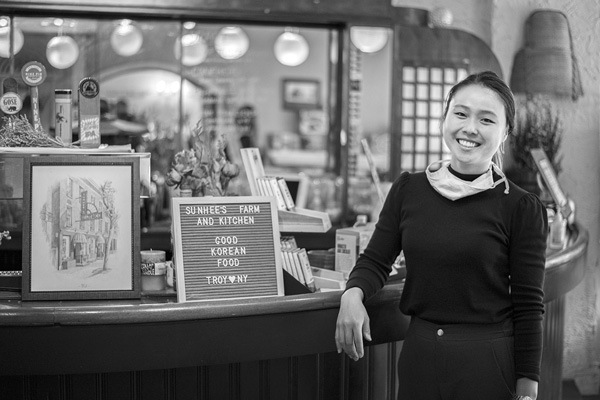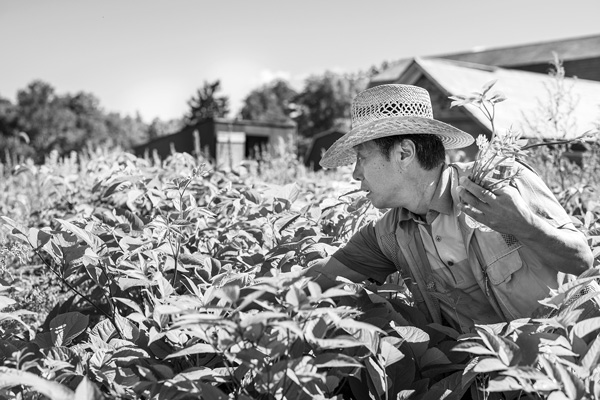News & Issues September 2020
A farm, tables and a taste of empowerment
Family’s restaurant operation aids immigrants, refugees

Jinah Kim, above, welcomes visitors to Sunhee’s Farm and Kitchen, her family’s restaurant in Troy, N.Y. Joan K. Lentini photo
By STACEY MORRIS
Contributing writer
CAMBRIDGE, N.Y.
Amos Kim is tending to a row of swelling pumpkins as another scorching August day reaches its peak.
There are weeds to groom, boxes of produce to harvest and chickens to feed. It’s only midday, and quitting time won’t come till 9 p.m. or later.
But as he presses on in the 90-degree heat, Kim is nothing but grateful.
Owning a farm is a longtime dream realized, and Kim, 63, cherishes every foot of the 41 acres of lush property atop a quiet hill in Washington County. It’s part of a family business that includes his wife, Chun Hee Kim, daughter Jinah Kim, and close family friend Sun Hwa Choi, whom Amos considers a sister.
The farm is only half of the family’s operation. Food grown and produced here is transported, several times a week, to Sunhee’s Kitchen, their restaurant 30 miles away in Troy.
“Many of the vegetables I grow are Korean,” Amos said.
Korean pumpkins, cucumbers and radishes grown at the farm become part of the soups, noodle dishes and rice bowls on the menu at the restaurant, which is at 95-97 Ferry St. in downtown Troy.
And the farm’s heads of cabbage, aromatic garlic and wild sesame take center stage in the restaurant’s famous kimchi recipe.
The farm and restaurant are symbiotic -- there wouldn’t be one without the other. And the story of how it all came to be goes back to the South Korean city of Incheon.
“When I was a little boy, my country was one of the poorest in the world,” Amos explained, recalling his childhood in the 1960s. “I experienced hunger.”
He survived with the help of food and clothing sent from the United States. Groups in this country also “sent ministers, and I became a Christian,” Amos said.
He looked across the field for a moment, lost in a distant memory.
“I feel like this country … is a mother country,” he said. “It gave me so much.”
A path to opportunity
After serving six years in the South Korean Army, Amos first traveled to the United States in the late 1980s to study economics at Illinois State University. He and Chun Hee lived in Normal, Ill., where their son Allen was born in 1987.
After Amos graduated, the family returned to South Korea, where Jinah was born in 1990. By the time Jinah was 3, Amos began to seriously weigh his options.
“I thought about my children’s future,” he recalled. “The United
States has a lot of opportunities if you work hard, and I decided it would be better if we are here.”
In 1993, the Kim family immigrated to the United States and lived for a time in Boston, where Amos worked at a family jewelry business and served as a minister at a Korean Baptist church. It was at the church where Chun Hee met Sun Hwa. The two women initially bonded in the church kitchen, preparing a meal, and quickly became best friends.
When Amos was asked to be minister at a Korean Baptist church in Latham, Sun Hwa moved to the Albany area with them. Because his position at the church was an unpaid one, Amos and Chun Hee made ends meet by working at a Mobil station near the Northway.
They cared for the children by working separate shifts, Jinah recalled.
“My mother worked during the day while my brother and I were at school, and my father worked the night shift,” she said.
To Amos, it didn’t matter that it wasn’t his dream job.
“I looked at the work as an honor,” he said. “And I used my background in mathematics to change the store’s accounting system.”
As opportunity-rich as their new country was, there were hurdles, in the form of language barriers and occasional hints of prejudice.
Though the Albany region is fairly diverse, Jinah said there were times growing up when she felt less than an equal member of society.
“It was tough sometimes,” she recalled. “My parents worked long hours, we were sometimes cash-strapped, and there were language and cultural barriers. I’d bring kimbap rolls to school for lunch, and other kids were like, ‘Ewww – seaweed!’”
Amos also acknowledged, when pressed, that as an immigrant he sometimes faced bias or belittling comments.
“Yes, I experienced it,” he said with a faint smile. “One person at a job called me a monkey because I was good at climbing. But my experience is: There are more good people here than bad.”
Linking farm and restaurant
As she grew to adulthood, Jinah dreamed of combining her passion for the food of her homeland with advocacy on behalf of immigrants.
When a former Irish pub became available in Troy, she jumped at the opportunity. The family opened its restaurant in 2016, and Jinah chose the name Sunhee – a hybrid of the names of the two friends whose cooking birthed the menu.
Jinah said the restaurant’s authentic Korean menu has garnered a diverse following.
“The kids at school made fun of me for eating vegetable rolls wrapped in seaweed,” she said, smiling. “Now they come in seeking it.”
The eggs that crown the colorful bowls of bibimbap (a vegetable-laden rice bowl) and the kimchi fried rice are sourced from the farm. The free-range chickens’ naturally diverse diet of bugs, worms, grass and restaurant scraps means better eggs, Amos said.
“The yolks are a deeper color, and they taste better,” he explained.
When the family bought its farm in 2012, Amos had long dreamt of working the land, but he had no prior farming experience.
“It was all trial and error, and some YouTube videos,” he said with a laugh.
“After living in Albany, my parents wanted something more peaceful,” Jinah said. “Koreans, in general, are very health-conscious, and they wanted to grow their own food.”
Today, both the farm’s garden and greenhouse overflow with vegetables, and Amos is always experimenting with new varieties. Some of the new offerings this year include flowering ginseng and Japanese angelica for seasoning, as well as sunchokes -- starchy tubers that Amos says are good for diabetics.
“My mom died of liver cancer,” he said. “So did my uncle, cousin and grandmom. There’s a family history. I had symptoms, but when I came to the farm, I ate very healthy and got cured.”
Menu with a mission
Although the family has focused its farm and restaurant on the mission of producing and serving authentic, healthy food, Jinah has given the restaurant, which she manages, a broader mission: providing more recent immigrants with empowerment through employment.
“We’re a business by immigrants for immigrants, and I decided to create programs to help employees achieve their goals,” she explained. “Immigrants often experience a sense of disconnection and isolation, and we provide a sense of community and support.”
For immigrant workers, the restaurant’s efforts have expanded to include free adult classes in English and computer literacy as well as help in acquiring laptops.
“It’s not a handout,” Jinah said of the program. “It’s a partnership.”
Jinah has vivid memories of her early struggles to master English.
“I was entering preschool when we first immigrated, and I didn’t speak in class for three months,” she said. “I just constantly bit my nails at my desk.”
Eventually, the preschool teacher revealed to Jinah’s parents that her first spoken word was “elephant.”
“Even at a young age, I felt embarrassment and humiliation of not being able to communicate and wanted to ‘wow’ those around me with a word that was more complex,” Jinah said. “In any case, this memory helps me better relate to adult English language learners, who must feel more embarrassment and humiliation at a time when they’ve had so many more life experiences.”
The restaurant’s website features stories of immigrants who were helped by the Sunhee program – people who came to the region from faraway places such as Burma, Guyana and Thailand, many of them fleeing famine and war.
“My daughter has a heart for new immigrants,” Amos said. “She believes she can offer them a stepping stone.”
There are currently 12 employees participating the restaurant’s program for immigrants, but at times the number has been as high as 20.

Jinah Kim's father, Amos Kim, raises vegetables for the restaurant at Garden of Eden Farms in Cambridge. Joan K. Lentini photo
Hard work, higher goals
After several years in which the restaurant has worked steadily to advance the lives of its immigrant workers and their families, Jinah has taken on a new challenge she hopes will further that mission: She is studying law, taking classes through a joint program of Albany Law School and Russell Sage College.
“I believe legal services are another realm to be integrated into the business,” she said. “Not just education, but issues like health care rights, they’re all tied together. We see the entire person. If they do well in their family life and in school, they’ll do well here in the business.”
Though the pandemic affected business for a time, Sunhee’s Kitchen is now serving customers on its outdoor patio and for take-out. It also hosts tented Korean BBQ events, in a lot across the street from the restaurant, on Friday and Saturday evenings.
Sun Hwa and Chun Hee spend much of their time at the stove in the restaurant’s kitchen. Pre-pandemic, they also hosted farm dinners and kimchi-making workshops at the farm. They hope to resume both as soon as health and safety standards allow.
As customers trickle in for take-out orders, a cacophony of sizzling can be heard in the kitchen. On the restaurant’s walls are a photographic tapestry of the Kim family’s journey from the port city of Incheon to a farm in Washington County and a restaurant in downtown Troy. The framed patchwork includes Korean soldiers in formation, a man gazing out at the Pacific Ocean, a flock of chickens at the farm, and Sun Hwa and Chun Hee smiling at the camera.
It all makes for a happy family, whose members are often tired from hard work.
“I’m just one guy,” Amos said as he trudged across a field at the farm. “I don’t know what I can do to thank this country. But we try to treat the people the way we would want to be treated. What we serve at the restaurant is the way we eat at home.”
Visit www.Sunhees.com for more information about Sunhee’s Farm and Kitchen.
